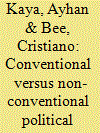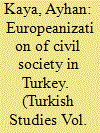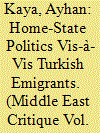|
|
|
Sort Order |
|
|
|
Items / Page
|
|
|
|
|
|
|
| Srl | Item |
| 1 |
ID:
151661


|
|
|
|
|
| Summary/Abstract |
This special issue focuses on the emergence of different forms of civic and political activism in Turkey. In doing so, we have taken into account different components of active citizenship and looked more specifically into the development of civic and political forms of activism that bridge the realms of conventional and non-conventional participation. As witnessed in many different contexts, conventional forms of political participation such as electoral politics are being replaced with non-conventional forms of participation that take place outside, and sometimes in opposition to, the more traditional channels of representation.
|
|
|
|
|
|
|
|
|
|
|
|
|
|
|
|
| 2 |
ID:
151667


|
|
|
|
|
| Summary/Abstract |
As a clear depiction of unconventional forms of civic and political participation, the Occupygezi movement has revealed that a more comprehensive approach is needed to understand the deep socio-political drives underpinning the Turkish bid for EU membership. Focusing on three different framings, namely Euro-enthusiastic, Euro-sceptic and critical Europeanist frames, developed by civil society organizations in Turkey since the 1999 Helsinki Summit, this article will analyze the transformative effect of the Occupygezi movement on various civil society groups which had previously been Euro-sceptic. Subsequently, the article will claim that the critical Europeanist frame has recently become stronger. Methodologically, the article will be based on a literature survey on the civil society actors, as well as discourse analysis of some particular associations, trade unions and the media organizations in relation to their changing perception of the EU before and after the Occupygezi movement.
|
|
|
|
|
|
|
|
|
|
|
|
|
|
|
|
| 3 |
ID:
188176


|
|
|
|
|
| Summary/Abstract |
This article scrutinizes the ways in which Turkish state actors have shaped the social ecosophy of emigrants and their descendants residing in Europe. Describing the Turkish state’s perspectives toward emigrants reveals that Turkish state actors always have instrumentalized emigrants since the beginning of the migratory processes in the 1960s. The focus will be on the current Turkish government’s acts and policies, which are likely to contribute to the Muslimization of Turkey-origin emigrants in diaspora, or in other words, to their labeling simply as ‘Muslims’. Based on a thorough analysis of secondary literature, discourse analyses of contemporary Turkish political leaders’ speeches aimed at Turkish emigrants and their descendants as well as my earlier and ongoing field research findings, I argue that it is the indifference of some European state actors who have not offered political opportunity structures for devout Muslims with Turkish background to be incorporated into the public/political space at the expense of pushing them into the Turkish state actors’ hands that offer alternative political opportunity structures. Hence, the article elaborates the ways in which receiving states’ policies and practices toward migrant-origin people impact diaspora politics of the migrant-sending states. The emphasis is on German and Turkish state actors.
|
|
|
|
|
|
|
|
|
|
|
|
|
|
|
|
| 4 |
ID:
172112


|
|
|
|
|
| Summary/Abstract |
Based on the findings of fieldwork conducted in the spring of 2017 with the supporters of the Justice and Development Party (AKP) in Istanbul and the supporters of the National Front (FN) in Toulon and other French cities, this article aims to compare the ways in which both groups highlight nativist, anti-multiculturalist and Eurosceptic positionalities. Having a republican and laicist legacy, both states have similar paths in terms of state-building processes. There is also another similarity in both countries regarding the ways in which both right-wing populist parties have capitalized on socio-economic and nostalgic deprivations of various societal groups who are exposed to the detrimental effects of global flows. The main premise of the article is that both parties contribute to the rise of civilizationist rhetoric by culturalizing what is social, economic and political in origin. It will be argued that it is not only social-economic deprivation that make some people attracted to populist rhetoric, but also nostalgic deprivation, which prompts them to try to find remedies to cure the feeling of loss resulting from the disappearance of established notions of nation, identity, culture and heritage in the age of globalism.
|
|
|
|
|
|
|
|
|
|
|
|
|
|
|
|
| 5 |
ID:
174017


|
|
|
|
|
| Summary/Abstract |
This article aims to assess the relationship between populism and immigration in the European Union and their impact on EU–Turkey relations. Following a literature review on the current state of populist movements in the EU as well as on the findings of a comparative fieldwork conducted in Germany, France, Italy, Greece and the Netherlands, the article seeks to understand and explain how the debates on migration, refugees, mobility and Islam have an impact on the rise of extreme right-wing populism. Starting with the depiction of the main constituents of populist rhetoric in Europe vis-à-vis migrants and refugees, the article subsequently analyses social-economic, political and cultural drivers of populist extremism, and the resentment against diversity, multiculturalism, Islam, immigration and mobility among the supporters of populist parties in five selected European countries. In the last section of the article, the impact of right-wing populism and Islamophobia on the EU–Turkey relations will be analyzed.
|
|
|
|
|
|
|
|
|
|
|
|
|
|
|
|
|
|
|
|
|